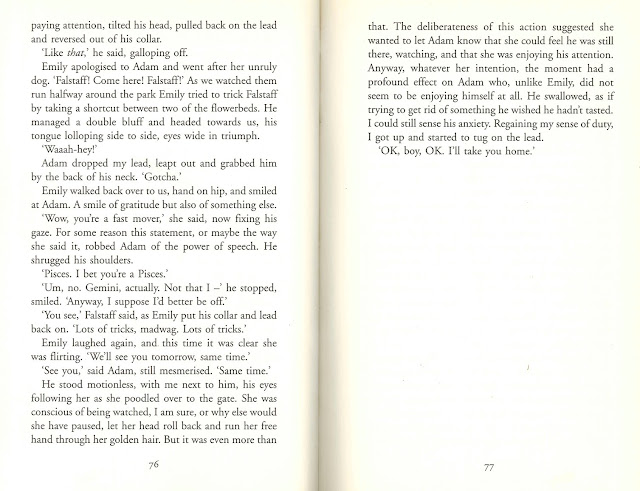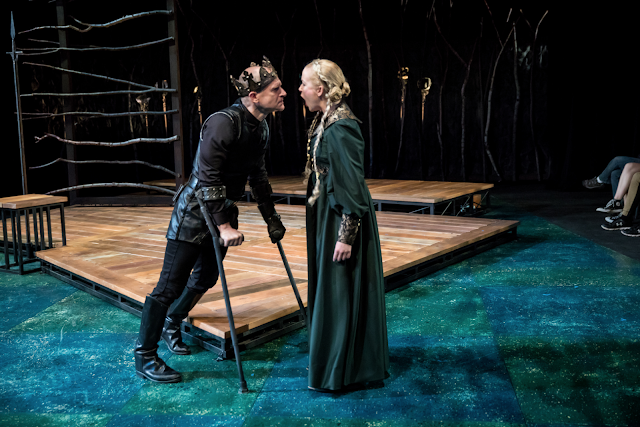 King Lear. Dir. Joseph Haj. Perf. Nathan Barlow, Thomas Brazzle, Shá Cage, Sun Mee Chomet, J. C. Cutler, and Nathaniel Fuller. Guthrie Theatre Company. Minneapolis. 11 February—2 April 2017.
King Lear. Dir. Joseph Haj. Perf. Nathan Barlow, Thomas Brazzle, Shá Cage, Sun Mee Chomet, J. C. Cutler, and Nathaniel Fuller. Guthrie Theatre Company. Minneapolis. 11 February—2 April 2017.
What better day could there be to see a production of
King Lear than April 1?
The only problem is that it was the penultimate day of the show's run, so I didn't feel much pressure to review the play right away. Still, now that I'm able to catch up on some missed opportunities, I'd like to make a few notes on the show.
First, the most impressive part of the production—indeed, of any production I've seen at the Guthrie thus far—was the lighting. I don't always notice the lighting (which may be the point of a subtle lighting design), but this one was transcendent. The stage was also the largest I've seen—a huge expanse of what is usually backstage space was opened up, and the lighting filled it in a number of fascinating and fabulous ways. Transitions were masterful; shadows were dramatic and purposeful; colors matched moods exquisitely.
Next, the rest of the production, which was underwhelming in the extreme. Some people reported to me that it was the worst Shakespeare play they'd ever seen—but it wasn't as abysmal as that. All the same, it wasn't good. The acting from all parties lacked backbone. There was no verve. Most of the players had a distinct two-volume delivery: Audible and Shouting.
Haj made some interesting individual directorial decisions, but they didn't every coalesce into a whole. If any of these decisions had been built into themes, provided supporting decisions, or made integral to the characters, they would have done something to the play. As it was, they seemed like notes from a preliminary brainstorming session. "What if . . . ?" "How about having . . . ?" "Oh, we could . . ."
Let me give you a few examples.
For the blinding scene, Cornwall spooned out Gloucester's first eyeball and dropped it in a cocktail glass—I think it was a highball glass.
Say it with a Cockney accent, and you'll get the joke.
Not unexpectedly, it turned the blinding of Gloucester into a joke as well. There is admittedly a fine line between horror and humor in this scene in many productions, but it was an unworthy choice.
Next, after Cornwall was hurt by his servant, Regan took off her high-heeled shoe and poked out the other eye of Gloucester. With a stronger Regan, that might have been brilliant. Diana Rigg (for whom,
q.v.) could have carried it off with the right mood of cool calculation. But this Regan had been giggly and shouty by turns, and there's no way it could have been anything but ridiculous.
The Fool in
Lear disappears after Act III, scene vi. Any given production can provide an explanation for that disappearance or provide the explanation the text gives: None. Trevor's Nunn's production, for example, shows its Fool captured and hung by the soldiers of Lear's enemies.
In this production, Lear, in his madness, stabs the Fool during the trial scene, killing him.
That's an interesting choice. But the production does nothing with it. And nothing will come of nothing. Not only does the Fool's murder / homicide under insanity not make its way into the rest of the play, it barely registers in the scene itself! The text, of course, doesn't allow for reflection on the Fool's murder, but the production could have found a way to bring it back in—presenting Lear with a bloodstained fool's cap during his recovery, for example. As it is, it was a scattered, unconnected idea in a scattered, unconnected play.
The play at the Guthrie's website.
 "Bottom Dreamed a Dream." Pyramus! Unproduced Off-Broadway Musical.
"Bottom Dreamed a Dream." Pyramus! Unproduced Off-Broadway Musical.

















































